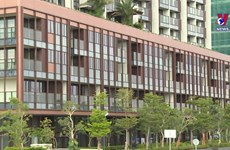ADB needs to increase investment in agriculture
The Asian Development Bank (ADB) should provide more financial resources
and investments for the agricultural sector in Asian countries in order
to strengthen food security and prevent inflation due to high food
prices.
The idea was contributed by members of ADB’s Board of Governors and representatives from large countries at the first plenary session of the 44th annual ADB meeting in Hanoi on May 5.
The idea was contributed by members of ADB’s Board of Governors and representatives from large countries at the first plenary session of the 44th annual ADB meeting in Hanoi on May 5.
The Asian Development Bank (ADB) should provide more financial resources
and investments for the agricultural sector in Asian countries in order
to strengthen food security and prevent inflation due to high food
prices.
The idea was contributed by members of ADB’s Board of Governors and representatives from large countries at the first plenary session of the 44 th annual ADB meeting in Hanoi on May 5.
According to an Indian representative, the current rising inflation trend in the region is causing adverse impacts on poor people in each nation and the whole region as well. Therefore, together with priorities given to disaster mitigation, ADB should increase investment in the agricultural sector and strengthen connectivity through public-private partnership (PPP) for agricultural development.
In addition, ADB needs to boost soft links to speed up cooperation and information sharing in addressing issues such as epidemics and natural disasters in the region.
The Indian representative suggested ADB promptly discover an effective mechanism to connect the Asian region with Africa and strengthen the South-South cooperation, as well as call upon its member countries to contribute more to ADB’s fund, in order to increase resources for development and for addressing regional challenges.
Sharing this point of view, Marisa Lago, Assistant Secretary for International Affairs and Treasury Department of the US , warned that high inflation accompanied by high food and fuel prices are threatening the recovery of Asia , while poor people are yet to get appropriate assistance in food and energy to cope with the shock.
Therefore, to reach sustainable development, developed countries in Asia should share trade surpluses with developing ones, she said.
The US wants ADB to maintain stable loans for underdeveloped countries, which need ADB resources to develop their economies and narrow the development gap with the developed, she said.
While emphasising the importance of pouring more into the ADB fund, Lago said the US will cooperate with ADB and other financial organisations to maximise this source of capital.
A German representative stated that agricultural development should be relocated onto ADB’s investment focus to ensure regional food security and effectively fight inflation and high food prices.
Pointing out challenges facing the region, a representative from the Republic of Korea suggested establishment of an Asian vision committee led by ADB, to strengthen connectivity among member countries, share information and effectively settle challenges in general inequality and development gaps.
The recovery and growth of Asia are a result of economic restructuring, he said, adding that to reach the goal of sustainable and balanced growth, ADB should have more flexible policies that create more conditions to increase capital sources for poor countries in the region.
The participants suggested ADB focus more investment on regional export and infrastructure, with its continued support for Asian countries to develop markets and connect supply networks.
ADB needs to continue making reforms on administration and strengthen cooperation with the World Bank (WB), the International Monetary Fund (IMF) and G8 countries to intensify its power.
Earlier, ADB President Kuroda and RoK Minister of Strategy and Finance Jeung-Hyun Yoon signed an agreement to extend and expand RoK support for ADB projects in Asia-Pacific in the fields of renewable energy, water, sustainable transport, education, finance and administration.
On the evening of May 5, Deputy Prime Minister and Foreign Minister Pham Gia Khiem hosted a banquet for participants of the 44 th annual ADB meeting./.
The idea was contributed by members of ADB’s Board of Governors and representatives from large countries at the first plenary session of the 44 th annual ADB meeting in Hanoi on May 5.
According to an Indian representative, the current rising inflation trend in the region is causing adverse impacts on poor people in each nation and the whole region as well. Therefore, together with priorities given to disaster mitigation, ADB should increase investment in the agricultural sector and strengthen connectivity through public-private partnership (PPP) for agricultural development.
In addition, ADB needs to boost soft links to speed up cooperation and information sharing in addressing issues such as epidemics and natural disasters in the region.
The Indian representative suggested ADB promptly discover an effective mechanism to connect the Asian region with Africa and strengthen the South-South cooperation, as well as call upon its member countries to contribute more to ADB’s fund, in order to increase resources for development and for addressing regional challenges.
Sharing this point of view, Marisa Lago, Assistant Secretary for International Affairs and Treasury Department of the US , warned that high inflation accompanied by high food and fuel prices are threatening the recovery of Asia , while poor people are yet to get appropriate assistance in food and energy to cope with the shock.
Therefore, to reach sustainable development, developed countries in Asia should share trade surpluses with developing ones, she said.
The US wants ADB to maintain stable loans for underdeveloped countries, which need ADB resources to develop their economies and narrow the development gap with the developed, she said.
While emphasising the importance of pouring more into the ADB fund, Lago said the US will cooperate with ADB and other financial organisations to maximise this source of capital.
A German representative stated that agricultural development should be relocated onto ADB’s investment focus to ensure regional food security and effectively fight inflation and high food prices.
Pointing out challenges facing the region, a representative from the Republic of Korea suggested establishment of an Asian vision committee led by ADB, to strengthen connectivity among member countries, share information and effectively settle challenges in general inequality and development gaps.
The recovery and growth of Asia are a result of economic restructuring, he said, adding that to reach the goal of sustainable and balanced growth, ADB should have more flexible policies that create more conditions to increase capital sources for poor countries in the region.
The participants suggested ADB focus more investment on regional export and infrastructure, with its continued support for Asian countries to develop markets and connect supply networks.
ADB needs to continue making reforms on administration and strengthen cooperation with the World Bank (WB), the International Monetary Fund (IMF) and G8 countries to intensify its power.
Earlier, ADB President Kuroda and RoK Minister of Strategy and Finance Jeung-Hyun Yoon signed an agreement to extend and expand RoK support for ADB projects in Asia-Pacific in the fields of renewable energy, water, sustainable transport, education, finance and administration.
On the evening of May 5, Deputy Prime Minister and Foreign Minister Pham Gia Khiem hosted a banquet for participants of the 44 th annual ADB meeting./.













